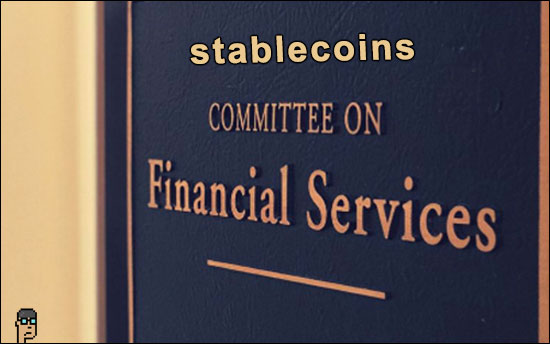Here’s today’s blockchain tipsheet… prefer it by email? Sign up here.
stablecoin opportunity
The GOP’s House Financial Services Twitter account chimed in yesterday, “The Biden Administration’s attack on stablecoins threatens U.S. dominance of the digital economy.” The tweet promoted an op-ed by former Hill staffer to Orrin Hatch (R, UT) and others, Sam Lyman, who sounds the alarm in Fortune on the slowly dwindling opportunity for the US dollar to integrate itself within global stablecoin infrastructure.
Lyman discusses securing US Dollar supremacy for the next decade and concludes hopefully, “Stablecoins are not a problem- they are an opportunity. And with the right regulation, we can seize this opportunity to empower consumers, expand American hard power, and plant our flag in the emerging digital economy.” Read more on Fortune.
Others have posited solutions with short-term U.S. Treasuries which would support U.S. dollar supremacy longer term via the Fed’s Project Hamilton. Read more on that one from last year’s Permissionless conference.
UK – getting closer to crypto
The Prudential Regulatory Authority (PRA), which regulates banks in the U.K., is on the verge of proposing rules for issuing and holding digital assets according to a speech from the Bank of England. CoinDesk explains, “Once the Financial Services and Markets Bill becomes law, authorities will have powers to regulate the sector.” Read it.
Tips:
DC event
Chamber of Digital Commerce announced additional participants for its DC Blockchain Summit on March 21 including U.S. Rep. French Hill (R, AR), Chair, Subcommittee on Digital Assets, Financial Technology and Inclusion, CFTC Commissioner Kristin Johson and IRS Digital Assets Project Director Julie Forester.
The agenda already includes a wide-range of participants in the U.S. crypto regulation discussion including Majority Whip Rep. Tom Emmer (R, MN), Jared Bernstein, Member, White House Council of Economic Advisers, and Him Das, Acting Director, FinCEN. See the agenda.
Canada – registration for crypto
On the Canadian law firm McCarthy-Tetrault’s blog, new Canadian government crypto requirements are analyzed as a limited sandbox of sorts is rolled out for the country’s unregistered crypto exchanges. “Canadian Securities Administrators (CSA) started a 30-day countdown for unregistered crypto asset trading platforms (CTPs) operating in Canada pursuing registration to provide to their principal regulator a stricter pre-registration undertaking (PRU) with content prescribed in [the new CSA staff notice].” Read more about it on the blog.
The clear guidance – the initial step in the registration can be achieved within 30 days – seems admirable. Securities and Exchange Commission (SEC) Chair Gary Gensler often talks about about having U.S. crypto companies “come in” and get registered. But, there seems to be little hope for registrants to get approved in the U.S. amid the fusillade of enforcement actions.
Indonesia – state-backed crypto exchange
In the wake of the FTX implosion, Indonesia is looking to enable a massive overhaul of how crypto exchanges work in the country according to Bloomberg. State-controlled custody, clearing and execution appear to be at its core. “The roughly two dozen crypto exchanges in Indonesia would have to trade on the state-mandated national bourse, acting as brokers. (…) The new exchange may be established as early as mid-2023 and will be run by a private-sector company rather than the government,” says the head of the Commodity Futures Trading Regulatory Agency of Indonesia, Didid Noordiatmoko. Read more.
The article states that Indonesia ranks 20th among crypto adoption countries according to Chainalysis.
let’s burn crypto
This past week, IMF Managing Director Kristalina Georgieva said to her banking colleagues on Saturday that NOT regulating crypto is “untenable” and furthermore, “If regulation fails, if you’re slow to do it, then we should not take off the table banning those assets, because they may create financial stability risk.” Read more on Bitcoin.com.
But, the Financial Times’ Robin Wigglesworth takes issue with her call-to-regulation, “Any effort to impose regulation might just give the space an official imprimatur. After all, there’s a reason why so many libertarian crypto bros are now espousing the benefits of regulations and lobbying for more government involvement (FTX was a pioneer in this).” Read his piece, “Don’t let crypto burn?”
G-20 crypto framework
During last weekend’s G-20 meeting of finance ministers in India, attendees recommended the creation of global regulation standards for the crypto industry, including stablecoins, according to Decrypt. During a panel discussion, the Ministry of Finance of India suggested “there is also an existential question on whether crypto assets are indeed the optimal solution for existing challenges in global financial systems.” Read more.
Tips:
-
- G20 Chair’s Summary and Outcome Document First G20 Finance Ministers and Central Bank Governors Meeting Bengaluru, February 24-25, 2023 (PDF)
- Crypto-Asset Reporting Framework (Oct. 22) – OECD
- Policy Perspective: “Debating the road to policy consensus on crypto assets” under G20 India Presidency – InsightsonIndia.com
high-risk crypto and sanctions
Financial sanctions on certain “high risk” Russian crypto exchanges are not having much of an impact says a new report from TRM Labs. TRM’s blog explains, “Russia remains home to the world’s largest number of high-risk crypto exchanges, with nearly 10% of all the transactions on its exchanges classified by TRM as high risk – a figure that has remained relatively constant before and after the invasion. Located beyond the reach of Western law enforcement, these high-risk exchanges saw cryptocurrency volumes in 2022 dip only slightly from the previous year, even as the crypto winter wiped out around 60% of the value of bitcoin.” Read more.
Tip: Read the report: “The First Crypto War? Assessing the Illicit Blockchain Ecosystem One Year Into Russia’s Invasion of Ukraine (PDF)“
more tips
-
- “Today, I had the pleasure of meeting in my D.C. office with [CFTC] Commissioner [Caroline Pham]…” – Rep. French Hill (R, AR) on Twitter
- When courts control DeFi – Digital Future Daily on Politico
- Q&A: Fair Value Accounting – Grayscale
- Is a crypto exchange under MiCA always responsible for the token-related whitepaper? – BCAS
If you would like this delivered as a newsletter, please sign up here.

